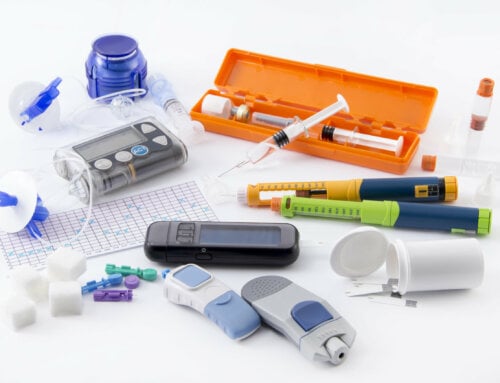
With years of experience as a health and wellness expert, Heller has assisted people with chronic health conditions – including diabetes, heart disease, obesity and cancer – adopt healthier lifestyles. Additionally, as a senior clinical nutritionist, Heller developed and ran NYU Langone Medical Center’s Outpatient Cardiac Rehabilitation & Prevention Nutrition program for nearly a decade.
Here is our conversation:
Please identify three simple things that a person with diabetes should do to manage their overall health.
First, I would say to be successful you have to educate yourself about what is healthy and what is not healthy. There is so much incorrect information and confusion about eating choices for a person with diabetes. Finding the accurate resources is essential!
As for three quick tips, I would say:
1. Have a strong support team – include medical professionals, friends and family. Everyone should share the same goals.
2. Learn your ABCs of diabetes management:
- A1C, or blood sugar, levels – work with your healthcare provider to set a schedule for blood sugar testing, understand what your numbers mean – both high and low – and how your food and physical activity choices can affect them.
- Blood Pressure – Get your blood pressure checked at every visit with your healthcare provider and talk about your blood pressure goals.
- Cholesterol – talk with your healthcare provider about how you can impact your cholesterol levels by making better food choices, exercising regularly and taking medications as directed
The Blood Sugar Basics program, a partnership between the American College of Endocrinology (ACE) and Merck, provides lots of helpful information about managing the ABCs online at BloodSugarBasics.com.
3. Never skip a meal. We often talk about what to eat and how it may affect your blood sugars. We rarely discuss how skipping a meal can be detrimental for a person with diabetes. You should never skip breakfast. Skipping meals or eating at irregular times can put people with type 2 diabetes at risk for experiencing low blood sugar, which may also be caused by changes in exercise or certain diabetes medications. Low blood sugar can make you feel dizzy, shaky or sweaty, and can lead to serious consequences if not treated quickly.
Nutrition labels contain all kinds of valuable information, but sometimes can be overwhelming. If you had to choose just three things on a label to review prior to purchasing a food item, which would they be?
Great question! When I teach, I dedicate a full hour to ‘How to Read a Food Label’.
Three areas to focus on and understand would be:
- Serving size / servings per container – know what size portion the label’s numbers are detailing
- Calories per serving
- Grams of carbohydrates per serving
It’s very hard to stick with only three, but that is a good start.
For people with diabetes, I have a ‘No-Trans’ policy – if you see trans fats or partially hydrogenated oils, put it back on the shelf and find another product!
Breakfast is often called the most important meal of the day. For someone who manages their diabetes well, how would you build the perfect breakfast for them?
I would recommend that everyone keep a food diary – it is a great way to look back and see how what you are eating may affect your blood glucose results.
As for the perfect breakfast, I like the idea of combining 1 protein and 1 carbohydrate depending upon your medication. You may need up to 2-3 servings of carbohydrate depending on your weight, exercise routine, blood sugars and medications. The protein helps slow the rise of blood sugar and the carbohydrates help fuel your cells and provide energy.
A few examples of 1 protein and 1 carbohydrate could be:
- An egg-white omelet with spinach and whole wheat toast
- peanut butter on a whole-grain English muffin
- fat-free Greek yogurt with some added fruit and a handful of whole-grain cereal
Nighttime snacking is hard to avoid. If you had to select the ideal snack that a person with diabetes could eat in the evening that is not ‘bad’, what would you choose?
I would encourage people to only have one snack after dinner, if they feel they need it. If your blood sugar levels are good in the morning, then you don’t need the extra calories brought on by late-night snacking. However, if your blood sugars are very low in the morning or if you wake up in a cold sweat during the night, that could be an indication of low blood sugar.
If that is the case, I would go back to the 1 protein and 1 carbohydrate recipe.
Try some crackers with low-fat cheese or maybe a cup of hot chocolate. Choose something that is small.
Of all of the ‘Super Foods’ that we read and hear about, which one has the greatest benefit to a person with diabetes?
I don’t think that there is one ‘Super Food’ that is ideal for diabetes, but when used together, there are tremendous benefits.
‘Super Foods’ are whole foods. Vegetables, whole grains, legumes, nuts, seeds, fruit, lean proteins, soy, edamame – these are super foods because they are so packed with vitamins, minerals, and anti-oxidants. They help address so many of the issues associated with diabetes; from blood pressure to inflammation to blood sugar management.
Work on combining as many of these super foods into your daily eating plan as you can.
Tell us a little about juicing. Are the nutritional benefits of juicing something that someone with diabetes should consider?
I don’t believe so. When you are juicing, you are leaving a lot of the important parts of fruits and vegetables out. Fiber is essential, and with juicing it is discarded. Juicing also becomes a very concentrated level of sugar and calories which is not beneficial for a person with diabetes. It is hard to drink a small amount of juice so the result is that we over-drink and ultimately take in more sugars.
For example, instead of drinking 4-6 ounces of carrot juice, I would like someone to eat a few raw carrots and dip them in hummus. That would be better for their waist -line and blood sugar levels. It is also about combining food groups.
Knowing and implementing the information we obtain about eating healthy are two different things. What is the best way to transition what we know into practical use?
I think that when people understand that they can make one simple, new step every few days it is a good start. Let’s say that the first step is to not skip breakfast. Taking a 15-minute walk instead of watching television right after dinner is a perfect second step.
A simplified approach is the way to go – take the fear and guess-work out of it.
Have concrete goals and track your progress along the way. You will enjoy seeing the results, and it is smart to celebrate them.
Tell us about the work you are doing with ‘Blood Sugar Basics’.
The program that I am working on is called ‘The Game Plan’ and it is part of Blood Sugar Basics, a free interactive online tool from the American College of Endocrinology (ACE), with support from Merck, that helps people with type 2 diabetes take small steps toward better management of the condition with the help of their healthcare provider. The Game Plan, which is available on BloodSugarBasics.com, breaks down diabetes management into four, easy-to-understand “goals” and was designed to be fun, educational, reader-friendly, and practical.
What is nice about ‘The Game Plan’ is that it is interactive. You are not just sitting there and reading something, you actually take part in the program. We offer tracking tools so you can track your food consumption, your blood glucose levels, and your exercise.
We give you access to track your progress – to be able to see how what you eat and how often your exercise affects your diabetes is a powerful tool. I think that this would be a great benefit to all people with diabetes – everyone can learn something new with ‘The Game Plan’.






Leave A Comment